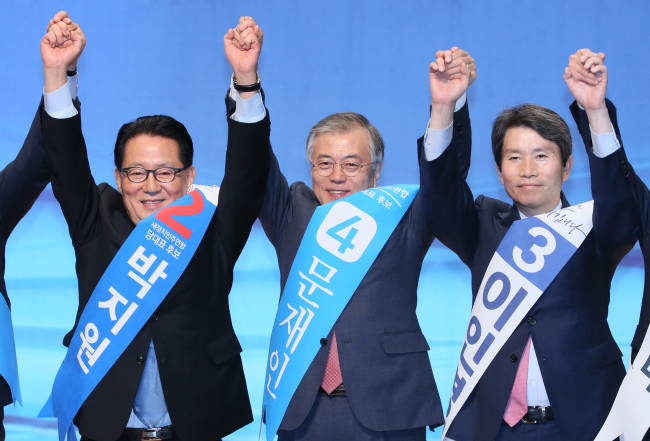One of the two political heavyweights running in the main opposition party’s chairmanship election early next month will likely win, but neither are fit to resolve the party’s persistent infighting, a cause of the party’s recent decline, experts said.
Reps. Moon Jae-in and Park Jie-won are strong contenders for the New Politics Alliance for Democracy’s chairmanship, to be determined through a vote by party officials on Feb. 8. The new leader will oversee the party in the 2016 general election and the 2017 presidential election. On Wednesday, Rep. Lee In-young filled the last spot on the slate for party chair through a primary.
But experts say Moon and Park are too invested in their respective factions to resolve intraparty bickering, a reason behind the party’s falling public ratings and landslide defeat to President Park Geun-hye’s governing Saenuri Party in July’s by-elections.
Reps. Moon Jae-in and Park Jie-won are strong contenders for the New Politics Alliance for Democracy’s chairmanship, to be determined through a vote by party officials on Feb. 8. The new leader will oversee the party in the 2016 general election and the 2017 presidential election. On Wednesday, Rep. Lee In-young filled the last spot on the slate for party chair through a primary.
But experts say Moon and Park are too invested in their respective factions to resolve intraparty bickering, a reason behind the party’s falling public ratings and landslide defeat to President Park Geun-hye’s governing Saenuri Party in July’s by-elections.

“Park (Jie-won) is one of the main people who has been using factionalism to his advantage. So don’t expect him to change the NPAD,” said Choi Young-jin, professor of Korean politics at Chung-Ang University in Seoul.
“Moon is even more inclined toward factionalism (than Park),” Choi added.
Koh One, a Korean politics professor at the Seoul National University of Science and Technology, likewise forecast darker skies for the main opposition party.
“Expect the opposition’s factional feuds to intensify after the convention,” he wrote in a book on prospects for Korean politics in 2015. Koh also raised the possibility that a third party could overtake the NPAD, as the nation’s main opposition party has been mired in layers of trouble.
The NPAD has suffered from falling approval ratings that sank below the 30 percent mark throughout 2014, according to Gallup Korea. Analysts say the low figure is likely due to the NPAD’s lack of policy initiatives and incoherence among its multiple factions.
The in-house division was most recently reflected in rumors that Chung Dong-young, a senior NPAD official and liberal presidential candidate in 2007, would leave the NPAD to found a third party to compete with the main opposition.
That party has still not materialized, but the coming NPAD convention is still likely to worsen factional rivalry.
Moon and Park are the respective leaders of the party’s two main factions. Moon leads the pro-Roh Moo-hyun faction, named after the late liberal president, while Park leads the old-school liberal camp, a faction that traces its roots to former President Kim Dae-jung.
But despite its troubles, the NPAD remains South Korea’s No. 2 political party by multiple standards. It holds 130 seats in the 295-seat National Assembly, behind only the Saenuri Party, which holds 158.
It ranks second among the nation’s top parties in major polls, although its ratings barely breach the 20 percent mark, according to Gallup Korea and Realmeter, another local pollster.
Analysts say the NPAD will have to get its act together before the 2017 presidential election if the left wing wishes to reclaim Cheong Wa Dae.
By Jeong Hunny (hj257@heraldcorp.com)
-
Articles by Korea Herald







![[Graphic News] More Koreans say they plan long-distance trips this year](http://res.heraldm.com/phpwas/restmb_idxmake.php?idx=644&simg=/content/image/2024/04/17/20240417050828_0.gif&u=)
![[KH Explains] Hyundai's full hybrid edge to pay off amid slow transition to pure EVs](http://res.heraldm.com/phpwas/restmb_idxmake.php?idx=644&simg=/content/image/2024/04/18/20240418050645_0.jpg&u=20240419100350)








![[KH Explains] Hyundai's full hybrid edge to pay off amid slow transition to pure EVs](http://res.heraldm.com/phpwas/restmb_idxmake.php?idx=652&simg=/content/image/2024/04/18/20240418050645_0.jpg&u=20240419100350)

![[Today’s K-pop] Illit drops debut single remix](http://res.heraldm.com/phpwas/restmb_idxmake.php?idx=642&simg=/content/image/2024/04/19/20240419050612_0.jpg&u=)